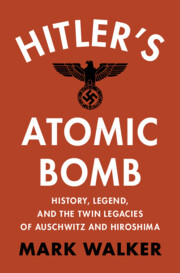Book contents
- Hitler’s Atomic Bomb
- Hitler’s Atomic Bomb
- Copyright page
- Dedication
- Contents
- Figures
- Preface
- Acknowledgments
- Abbreviations
- Introduction
- Part I The Bomb
- Part II Living with the Bomb
- 7 Oversimplifications
- 8 Compromising with Hitler
- 9 Rehabilitation
- 10 Copenhagen
- Conclusion
- Epilogue
- Glossary
- Notes
- Archives
- Bibliography
- Index
10 - Copenhagen
from Part II - Living with the Bomb
Published online by Cambridge University Press: aN Invalid Date NaN
- Hitler’s Atomic Bomb
- Hitler’s Atomic Bomb
- Copyright page
- Dedication
- Contents
- Figures
- Preface
- Acknowledgments
- Abbreviations
- Introduction
- Part I The Bomb
- Part II Living with the Bomb
- 7 Oversimplifications
- 8 Compromising with Hitler
- 9 Rehabilitation
- 10 Copenhagen
- Conclusion
- Epilogue
- Glossary
- Notes
- Archives
- Bibliography
- Index
Summary
In order to determine what really happened when Werner Heisenberg and Carl Friedrich von Weizsäcker met with Niels Bohr in occupied Copenhagen in September 1941, this visit has to be placed in several contexts. By this time the German uranium research had demonstrated that atomic bombs were probably feasible, even if not for Germany during the war. The summer 1942 German offensive against the Soviet Union had not yet begun to falter, although Heisenberg was nevertheless privately very anxious about the war. The Germans alienated Bohr and his colleagues by their participation in cultural propaganda and nationalistic and militaristic comments about the war. A comparison with Heisenberg’s other lecture trips abroad shows that he acted the same way in other places. Heisenberg’s subsequent efforts in 1942 to gain support from Nazi officials by both describing the power of atomic bombs and the threat that the Americans might get them first also do not fit with an attempt at Copenhagen to forestall all nuclear weapons. Instead the best explanation for the visit is Heisenberg and Weizsäcker’s fear of American atomic bombs falling on Germany.
Keywords
- Type
- Chapter
- Information
- Hitler's Atomic BombHistory, Legend, and the Twin Legacies of Auschwitz and Hiroshima, pp. 240 - 267Publisher: Cambridge University PressPrint publication year: 2024



